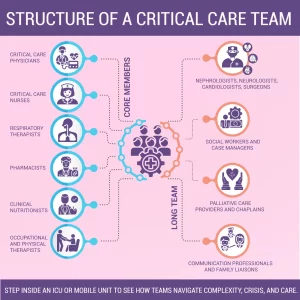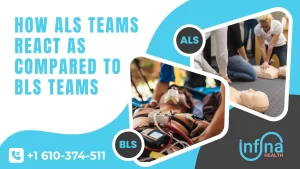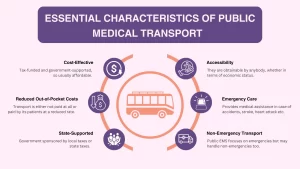In today’s healthcare system, the integration of mental health care with physical health care is more important than ever. Patients with mental health conditions often face additional challenges when it comes to medical transportation. These challenges can either be the anxiety of going to appointments, the stress of traveling to unfamiliar environments, or the discomfort of being transported in a vehicle for an extended period. Medical transportation staff and healthcare professionals must be prepared to address these unique needs to ensure a patient’s journey is as safe and comfortable as possible.
It is estimated that more than one in five U.S. adults live with a mental illness. This equates to 59.3 million people in 2022, or 23.1% of the U.S. adult population. With mental health issues affecting such a significant portion of the population, the importance of supporting patients with mental health conditions during their transportation cannot be overemphasized. In fact, individuals with mental health disorders are often more vulnerable during medical transportation, as they may experience heightened anxiety, agitation, or disorientation while traveling to and from healthcare appointments. This blog will explore the best practices and strategies for supporting patients with mental health conditions during a medical transport service.
Types of Mental Health Conditions Commonly Affected by Medical Transportation
Understanding the specific mental health conditions that are commonly affected by transportation can help medical teams better anticipate patient needs, reduce anxiety, and provide more effective support. Below are some of the most common mental health conditions that can be significantly impacted during medical transport.
- Anxiety Disorders: Anxiety is one of the most common mental health conditions that can impact a patient’s experience during transportation. Patients with generalized anxiety disorder, panic disorder, or phobias may experience intense feelings of fear or panic when traveling, especially in confined spaces or when facing uncertain outcomes.
- Depression: Depressed individuals often feel a lack of motivation or energy, and the act of traveling can feel exhausting or overwhelming. They may have trouble focusing on the journey and may become easily discouraged or fatigued by the process.
- Post-Traumatic Stress Disorder (PTSD): For individuals with PTSD, medical transportation can feel like a trigger for flashbacks, dissociation, or severe anxiety. The unfamiliar sights, sounds, or even the motion of the vehicle can exacerbate symptoms and increase the risk of panic.
- Bipolar Disorder: Patients with bipolar disorder may experience mood swings that affect how they respond to transportation. During manic episodes, patients might feel impulsive, restless, or overly energetic, which can lead to agitation or risky behavior. Conversely, during depressive episodes, patients may feel hopeless or withdrawn, making it difficult to engage in the transport process.
- Schizophrenia: For those living with schizophrenia, symptoms such as delusions, hallucinations, or disorganized thinking can make it challenging to navigate the journey. They may become easily disoriented or confused, especially when traveling to unfamiliar destinations.
Do you need compassionate transportation for a patient with anxiety, depression, or PTSD?
Challenges Faced by Mental Health Patients in Medical Transportation
Patients with mental health conditions are especially vulnerable to the stresses of transportation. These include:
- Being in an unfamiliar vehicle or environment can heighten anxiety, particularly for those with conditions like PTSD or panic disorder.
- The sights, sounds, and smells of the outside world, as well as the movement of the vehicle itself, can overwhelm individuals with anxiety or sensory processing issues, worsening their symptoms.
- Many mental health patients struggle with a perceived lack of control, which can make them feel even more vulnerable during transport. For instance, patients with PTSD may feel trapped in a vehicle, while those with anxiety might worry about unexpected events during the trip.
- Extended trips, uncomfortable seating, or irregular driving can add to a patient’s physical discomfort, which can, in turn, exacerbate mental health symptoms such as agitation or distress.
Pre-Transport Preparation to Support Patients with Mental Health Conditions
Preparation is key when transporting patients with mental health conditions. Understanding their needs ahead of time allows transport teams to develop a care plan and make necessary adjustments to create a more comfortable journey.
Patient Assessment and Communication
Before the trip, take the time to discuss the patient’s mental health history, triggers, and coping strategies. Communication with the patient and their caregivers is essential for building a plan that addresses both physical and emotional needs.
- Ask the patient: “What usually helps you manage stress or anxiety?” or “Are there any triggers we should be aware of?”
- Work with caregivers or family: Caregivers often have valuable insights into the patient’s unique needs and preferences.
Creating a Care Plan
Once the patient’s needs are understood, develop a care plan that includes:
- Medication Management: Ensure that the patient has access to any necessary medications during transport, especially those for anxiety or other mental health conditions. Consider administering medications as needed before the trip to prevent symptoms from escalating.
- Trigger Identification: Identify potential triggers during transport (such as crowded spaces, loud noises, or even certain routes) and develop strategies to avoid or mitigate them.
- Coping Techniques: Include techniques for calming the patient, such as deep breathing exercises, guided relaxation, or distractions like calming music.
Training for Transportation Staff
Proper training is vital for ensuring that transportation staff are equipped to support patients with mental health conditions. Staff should receive training in the following areas:
- Recognizing symptoms of various mental health conditions.
- De-escalation techniques to manage anxiety or agitation.
- Empathy and communication skills for supporting patients through stressful moments.
Want to make a more informed decision about medical transportation?
On the major types of services available for different medical needs.
Supportive Environment During Transport for Patients with Mental Health Conditions
The environment inside the transport vehicle plays a crucial role in the patient’s experience. The goal is to create a calm, safe, and predictable space that minimizes stressors and helps the patient feel at ease.
Reducing Stress and Anxiety
Here are some strategies for creating a supportive atmosphere:
- Calm and Quiet: Keep the environment as quiet and calm as possible. Dim the lights and use soft, neutral colors to avoid overstimulation.
- Soothing Music or Sounds: Consider playing calming music or white noise to create a peaceful environment. This can be especially helpful for patients with anxiety or sensory sensitivities.
- Personal Items: Allow the patient to bring items from home that comfort them, such as a favorite blanket, pillow, or a small, familiar object. These can provide a sense of security during the journey.
Providing Reassurance
Offer frequent updates about the journey:
- Clear Communication: Let the patient know how much longer the trip will take, the route, and any stops along the way. This transparency can alleviate anxiety and give the patient a sense of control.
- Comforting Words: Reassure the patient that everything is okay, and that help is available if they need it. A calm, gentle tone can help create a sense of safety.
Crisis Control During Medical Transportation of Patients with Mental Health Conditions
Even with preparation, there may be times when a patient’s mental health condition escalates. Recognizing the signs of distress and being prepared to de-escalate is essential for maintaining a safe and supportive environment.
Recognizing Signs of Distress
Some early warning signs of distress might include:
- Physical symptoms like sweating, trembling, or rapid breathing.
- Behavioral symptoms like agitation, pacing, restlessness, or speaking rapidly.
- Emotional symptoms like crying, withdrawing, or expressing fear or confusion.
De-Escalation Techniques
If a crisis arises, use the following de-escalation strategies:
- It’s essential that the transportation staff remain calm and composed, even if the patient becomes agitated or distressed.
- Use Soft, Reassuring Language: Speak in a slow, gentle tone, and use calming phrases such as “You’re safe,” or “We’re almost there.”
- Give the patient some sense of control over their environment, such as allowing them to adjust the temperature or open a window.
- Offer distractions, like focusing on breathing exercises or engaging in light conversation, to help the patient regain focus and calm down.
Post-Transport Considerations to Support Patients with Mental Health Conditions
After arriving at their destination, it’s important to check in on the patient’s well-being. Whether they used non-emergency medical transportation for a routine appointment or critical care transportation for a more complex condition, ensuring that they have proper follow-up care is essential.
Monitor the Patient’s Well-Being
After transport, check in with the patient to ensure they’re feeling settled and supported. Address any lingering distress or concerns, and provide information about any follow-up appointments or therapy sessions.
Provide Aftercare Resources
Offer the patient resources for further mental health support, such as community services, counseling, or hotlines. A smooth transition from transport to ongoing care. is essential for ensuring continued support.
If you’re considering medical transport for mental health or physical health concerns, our blog outlines five reasons why it’s the right choice.
Conclusion
Supporting patients with mental health conditions during medical transportation services require careful preparation, empathy, and attention to their unique needs. By following best practices for pre-transport preparation, creating a supportive environment, and managing potential crises, medical transportation providers can greatly improve the patient experience.
At Infina Health, we specialize in providing compassionate and reliable medical transportation services for individuals with mental health conditions. Our trained drivers and staff are equipped to support patients with anxiety, PTSD, depression, and other mental health challenges, ensuring a safe and comfortable journey.






